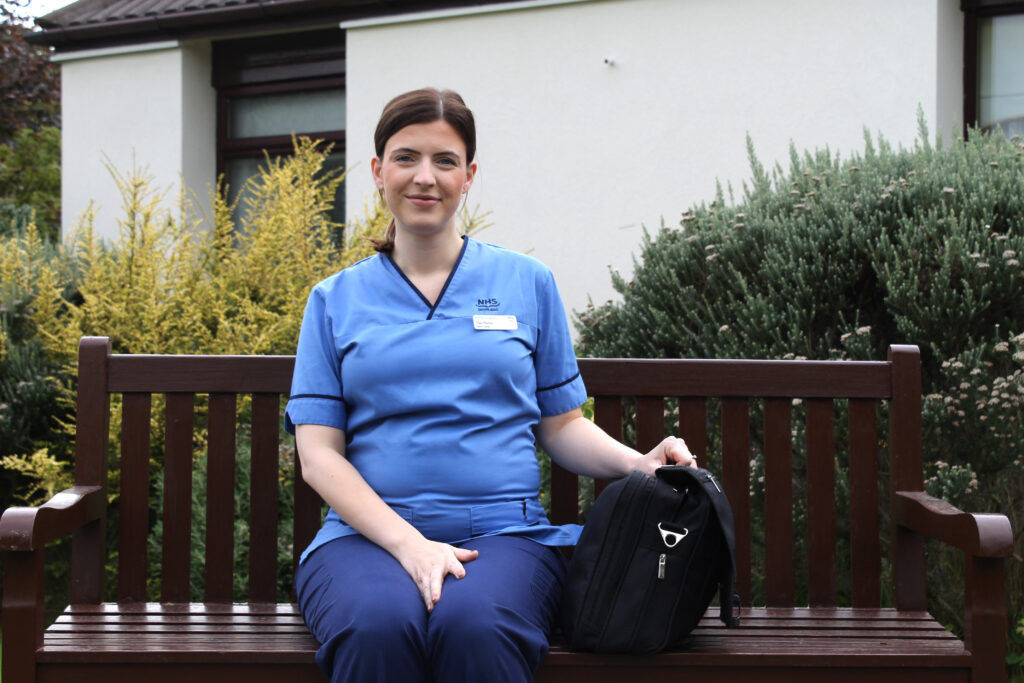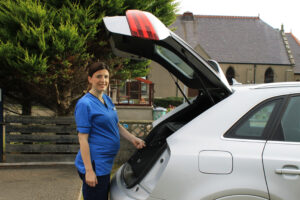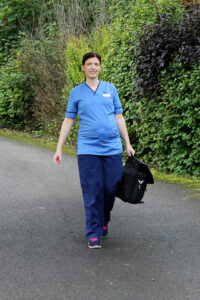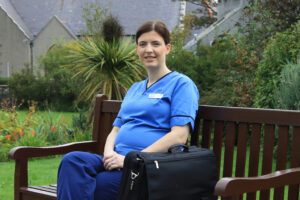Inga Mackay
District Nurse
NHS Orkney

I had a placement in the community when I was a student nurse and I loved it. I enjoyed the different pace to the hospital and being able to spend time with my patients. My first post was as a community staff nurse, so I found my niche straight away. I enjoyed the autonomy but felt supported by a fantastic team. It’s such a different experience to visit people in their own homes, they are more relaxed, and you do feel like a guest. You can make conversation and connections by using the visual cues you see in their surroundings. Enabling someone to remain at home can make a huge impact on the patient and their family and this makes the job extremely rewarding.

I want to enable people to live at home and be as independent as possible, to help them to manage their own condition, supported by their families and caregivers. It might not even be health related, they could need financial help, or assistance with legalities like getting Power of Attorney in place and my role is to signpost individuals where to get assistance with this I really enjoy complex case management – I’m quite a problem solver by nature and don’t want to be beaten. I’ll do anything I can to keep people at home, providing it’s still safe to do so. My role is part of a complex network and I enjoy working closely with social workers, home carers, intermediate care teams, physios, speech and language therapists and dieticians. services. The biggest part of my caseload is older people and loneliness can be a major problem. I’m grateful that Orkney has a close-knit community, it means issues are usually flagged up quickly but that doesn’t always prevent loneliness and I want to change that.

The skills of the district nurse are around advanced clinical assessment skills, history taking, prescribing and nursing assessment. Often, we get involved to support people at the end of their life, to care for them and their families and enable someone to die peacefully at home. The beauty of our job is that we generally know people well, having created relationships over months and years. You need really good communication skills and to be adaptable. Our expertise is in reading situations and bringing expert assessment skills to recognise even the smallest change. And one of the great joys is meeting many different people and hearing their stories.
Particularly in a small community, professionalism and boundaries are so important. Over time people learn about you too; everyone needs to feel safe in the relationship and that is something we work to sustain.
The role of the district nurse has changed so much over the years. When people watch a programme set in the 50s and 60s like ‘Call the Midwife’ they think that’s what I do but the reality is so different now. We are advanced practitioners, we prescribe, we lead teams and we’re nurse-led which means we are experienced clinical decision makers. I want the public to embrace these changes. We should be celebrating the advances and getting contemporary community nursing back on the map. Looking at the wider structure – governments, councils, schools, churches, GP surgeries and care homes need to know what we do. Community nurses are such an undervalued resource.
The programme was absolutely amazing, it made me uncover and expose every corner of myself and that’s not the type of person I am, at all! It coaxed me out of my comfort zone at a pace that felt right. I met so many other people that were passionate about what they did. To begin with, I felt as though I wasn’t worthy of being part of it, but by the end, I had developed my self-confidence. I am good at what I do and that’s why I’m here.
The programme has pushed me to be the best version of a leader I can be. Having self-belief allows me to confidently share my improvements with everyone in the team around me.

COVID has affected me quite strongly on a personal level as I had just found out I was pregnant at the beginning of the pandemic. I had to put myself before my work for the safety of the baby and I found that hugely challenging. Shielding means I’ve had less face-to-face contact with patients, and I’ve really missed it. I have put all my efforts into managing my team remotely via Zoom calls and MS Teams. I taught myself how to use this new technology so I could support staff. We’re lucky that on the island we haven’t been hit badly with cases, but a big part of my job is putting plans together for every eventuality. Team splits, deployment of staff and levels of protective equipment are daily considerations.
I’m very lucky to have open spaces where my husband and I can go out walking. Time with family and friends has become even more important and being part of the Queen’s Nurse cohort has made such a difference. I practice mindfulness and I enjoy baking. Right now, going to other Orcadian islands feels like a holiday since there are no other tourists. Looking for the positives and enjoying the scenery on my own doorstep is getting me through.
